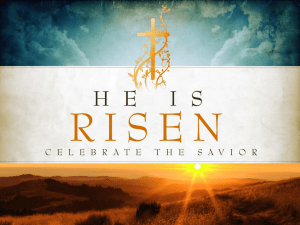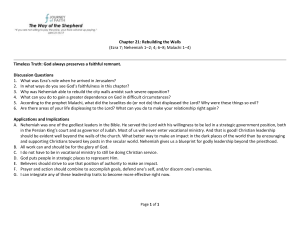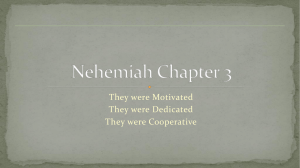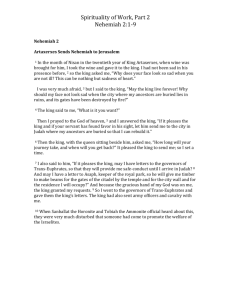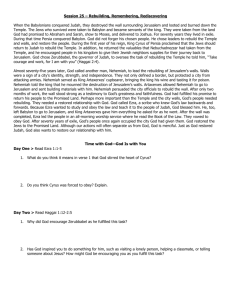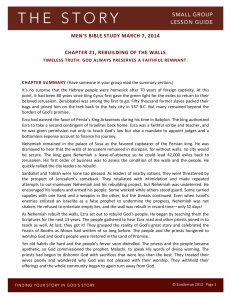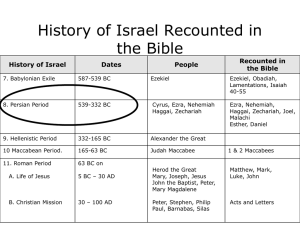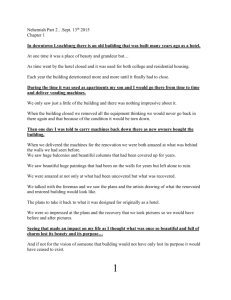Bible reading Plan week 28 - Elim Community Church, Carlisle
advertisement
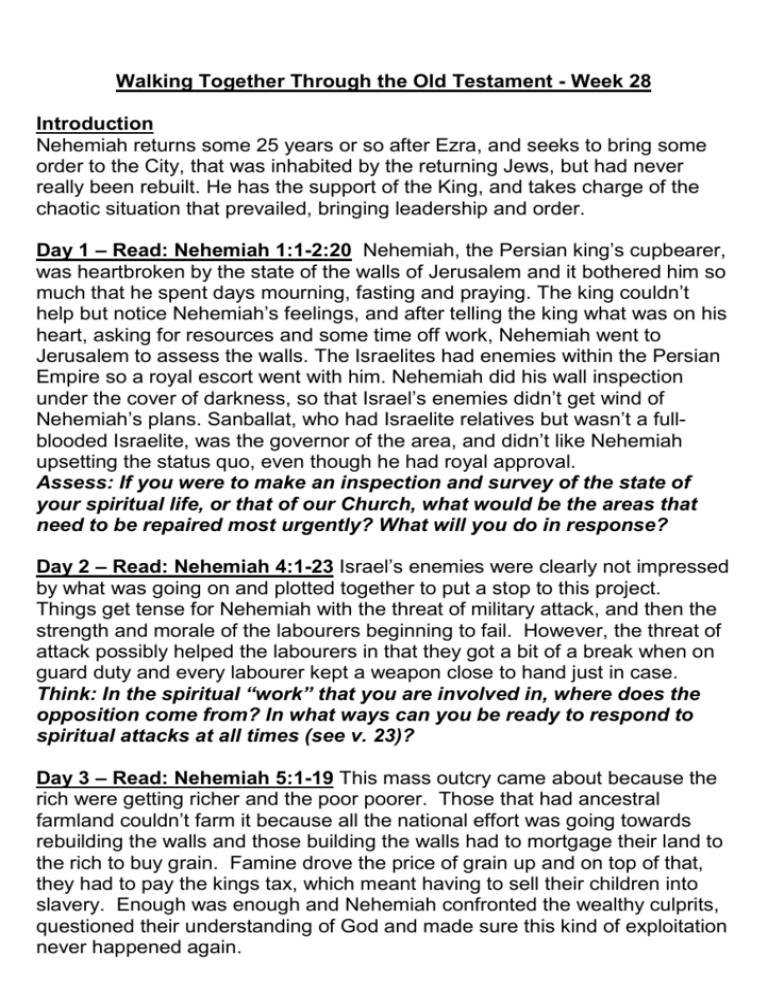
Walking Together Through the Old Testament - Week 28 Introduction Nehemiah returns some 25 years or so after Ezra, and seeks to bring some order to the City, that was inhabited by the returning Jews, but had never really been rebuilt. He has the support of the King, and takes charge of the chaotic situation that prevailed, bringing leadership and order. Day 1 – Read: Nehemiah 1:1-2:20 Nehemiah, the Persian king’s cupbearer, was heartbroken by the state of the walls of Jerusalem and it bothered him so much that he spent days mourning, fasting and praying. The king couldn’t help but notice Nehemiah’s feelings, and after telling the king what was on his heart, asking for resources and some time off work, Nehemiah went to Jerusalem to assess the walls. The Israelites had enemies within the Persian Empire so a royal escort went with him. Nehemiah did his wall inspection under the cover of darkness, so that Israel’s enemies didn’t get wind of Nehemiah’s plans. Sanballat, who had Israelite relatives but wasn’t a fullblooded Israelite, was the governor of the area, and didn’t like Nehemiah upsetting the status quo, even though he had royal approval. Assess: If you were to make an inspection and survey of the state of your spiritual life, or that of our Church, what would be the areas that need to be repaired most urgently? What will you do in response? Day 2 – Read: Nehemiah 4:1-23 Israel’s enemies were clearly not impressed by what was going on and plotted together to put a stop to this project. Things get tense for Nehemiah with the threat of military attack, and then the strength and morale of the labourers beginning to fail. However, the threat of attack possibly helped the labourers in that they got a bit of a break when on guard duty and every labourer kept a weapon close to hand just in case. Think: In the spiritual “work” that you are involved in, where does the opposition come from? In what ways can you be ready to respond to spiritual attacks at all times (see v. 23)? Day 3 – Read: Nehemiah 5:1-19 This mass outcry came about because the rich were getting richer and the poor poorer. Those that had ancestral farmland couldn’t farm it because all the national effort was going towards rebuilding the walls and those building the walls had to mortgage their land to the rich to buy grain. Famine drove the price of grain up and on top of that, they had to pay the kings tax, which meant having to sell their children into slavery. Enough was enough and Nehemiah confronted the wealthy culprits, questioned their understanding of God and made sure this kind of exploitation never happened again. Consider: Nehemiah made changes to the treatment of the poor, but also made personal sacrifices (see verse 18). In what ways could you make changes to show concern for the poor and needy? Day 4 – Read: Nehemiah 6:1-7:4 Nehemiah’s enemies now tried a different tactic to stop the completion of the wall. This time they zeroed in on Nehemiah, thinking that if they could dispose of him the project would fail (a kind of ‘kill the brain and the body dies’ approach). Sanballat invented some spurious lies, which he threatened to tell the king, and then tried to get Nehemiah to hide in the inner sanctuary of the temple. Nehemiah needed faith to overcome the fear and anxiety that could have paralysed his activity, and prevented the wall being completed. Instead, by God’s grace, the wall was completed in 52 days. Reflect: What inner fears, or accusations by others, or worries and anxiety, could paralyse your growth and development? Look up the following verses and hear what says on the subject: Matthew 6:25-34; Philippians 4:6; 1 Peter 5:7. Day 5- Read: Nehemiah 8:1-18 The public reading of the law brought about a national sense of unity. This was a special event for the whole nation and it was read and explained in such a way that people could understand. It’s reading provoked an emotional response as the people came face to face with their sin. However, Nehemiah had to remind the people to celebrate this day, eat good food, have a party and include everyone, as God had to be celebrated. There is a place for feasting as well as fasting! The next day the feast of tabernacles was celebrated, which hadn’t been done in long time. This was a way of looking back on their past and remembering the time when their ancestors wandered in the desert. Celebrate! What can you look back and rejoice in? What answers to prayer has God supplied in recent days? How will you celebrate His goodness to you in some way this week? Review the week’s readings In the final reading of the day we considered the need to celebrate what God has done in our lives. Look at Nehemiah’s responses to difficulties and bad news in 1:3-4; 2:19,20; 4:3,4; 5:4-11. How did he respond in each situation? What can you learn from his example? Are you more prone to feast and celebrate than to fast and pray? What needs to be done to bring a right balance in your life at the present time?
